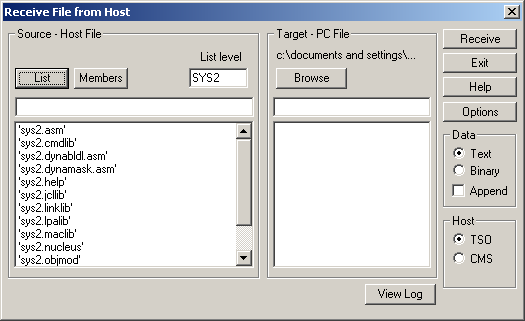

IND$FILE is a file transfer facility used to transfer data between MVS host systems and PC workstations. It can translate text files from EBCDIC to ASCII (mainframe to PC) or ASCII to EBCDIC (PC to mainframe) during the transfer. The file transfer dialog is part of the 3270 terminal emulator which calls IND$FILE on the mainframe, therefore the exact process of choosing files to send or receive is dependent on the terminal emulator implmentation. Check the documentation of your terminal emulator for specific details. I will demonstrate using Tom Brennan's Vista tn3270, a popular Windows 3270 terminal.
The steps involved in installing IND$FILE are almost identical to installing RPF. IND$FILE can be downloaded from the Hercules H390-MVS Yahoo! Groups file section. There are several files in the ZIP file, but the ones we're interested in are ind$file.jcl and ind$file.het.
00- V 480,ONLINE
IEE302I 480 ONLINE
00 JOB 2 $HASP100 LOADTAPE ON READER1 LOADTAPE JOB 2 IEF677I WARNING MESSAGE(S) FOR JOB LOADTAPE ISSUED - JOB 2 $HASP373 LOADTAPE STARTED - INIT 1 - CLASS A - SYS BSP1 - JOB 2 IEF403I LOADTAPE - STARTED - TIME=22.10.41 *JOB 2 *IEF233A M 480,INDFIL,,LOADTAPE,IND$FILE
- JOB 2 IEF404I LOADTAPE - ENDED - TIME=22.14.27
- JOB 2 $HASP395 LOADTAPE ENDED
Now that IND$FILE has been installed, it's time to use it.
Make sure you are at a TSO READY prompt or in the RPF TSO Command Processor (option 6) before you transfer a file with IND$FILE.
In this example, I'll copy a job from SYS2.JCLLIB to my PC.


Files are sent to and received from MVS in a TSO environment. That means your profile prefix (usually your user ID) is prepended to any datasets that are not enclosed in apostrophes. If you try to receive a file from SYS1.PROCLIB, it will look in USERID.SYS1.PROCLIB. I always use apostrophes and full dataset names to avoid this. (i.e. 'SYS1.PROCLIB')
Partitioned datasets must exist prior to file transfer. You cannot send a file to HERC01.MYSRC(MEMBER01) if HERC01.MYSRC does not already exist.